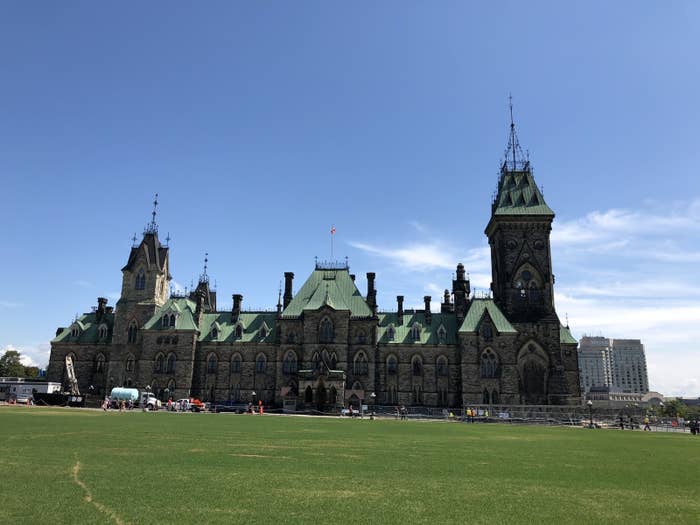
Foreign actors are unlikely to face serious consequences over interference campaigns in the lead-up to Canada’s 2019 federal election, national security and legal experts say.
Canada’s intelligence agencies have already identified foreign influence campaigns playing out in advance of the election. But there are serious barriers for Canadian authorities to bring those behind the campaigns to justice.
The largest barrier is the likelihood that those interfering are based outside of Canada.
“It would be more likely if that individual had a nexus to Canada somehow, if they were actually in Canada or there was a Canadian connection [in assisting the interference],” said Leah West, a Carleton University professor and former national security lawyer at the Department of Justice. “[But] I think the chances of seeing actual criminal charges come to fruition and people facing prosecution is low.”
West referenced the US Justice Department’s move to indict 12 Russian intelligence officers in 2018 for their alleged role in stealing emails from Democratic Party operatives in the lead-up to the country's last presidential election.
There’s almost no likelihood that any of those charged will face trial in the US. But the indictments did provide clear details about the actions of a foreign power attempting to swing an election — details that are unlikely to be released in Canada, barring a decision by intelligence agencies to alert Canadians to a major meddling campaign.
Michael Nesbitt, a national security law professor at the University of Calgary’s Centre for Military, Security and Strategic Studies, said the US indictments were also meant as a signal.
“Now that’s OK for the US, who can send that signal without serious risk of reprisal,” Nesbitt said. But Canada is unlikely to take action that would have any effect other than sending a signal to a place like China, he said.
Nesbitt agreed it’s unlikely that Canadian authorities could successfully bring foreign meddlers — including hostile intelligence services, state-backed hackers, and pressure groups from outside Canada’s borders, among others — before a Canadian court. It’s also a problem for Yves Côté, the commissioner of Canadian elections responsible for enforcing election laws.
In a statement, Côté’s office said it could charge foreign actors under the Canada Elections Act of “undue influence” in the campaign. If the interference has a cyber dimension — as most interference attempts have in recent Western elections — an actor could also be charged for the unauthorized use of a computer. But the elections office would still face the practical challenges, as well as the expense, of bringing charges outside the country.
Côté’s office said it is not yet aware of interference campaigns on the scale of the 2016 US presidential election.
“That said, we are going into this election knowing that it is a possibility that will have to be addressed,” wrote spokesperson Myriam Croussette in a statement.
A joint Toronto Star–BuzzFeed News investigation revealed Tuesday that Canada’s intelligence community has already identified foreign actors attempting to influence Canadian voters ahead of the Oct. 21 federal election.
In a public report released in June, the Canadian Security Intelligence Service called foreign interference in Canada a “significant threat to Canada’s national security and strategic interests.”
“These activities are carried out in a clandestine or deceptive manner, or involve a threat, and target communities or democratic processes in this country,” the report read. “In many cases, influence operations are meant to support foreign political agendas, a cause linked to a conflict abroad, or to deceptively influence Government of Canada policies, officials, or democratic processes.”
While the spy agency said that foreign actors are already targeting Canada’s democratic institutions, they stopped short of confirming foreign interference specific directed at the upcoming federal election.
“In this case, defense is your best offense. That’s really the only way to protect ourselves,” said Bessma Momani, a University of Waterloo political science professor and senior fellow at the Centre for International Governance Innovation.
“It really requires increasing digital literacy … showing people how this works, the distinction between real news and fake news — all of that is going to be very difficult.”
For now, it will be up to the intelligence services — and their political masters — to determine when a threat is sufficiently serious they need to warn the Canadian public. But who makes that call will change when the election is officially called.
The task will then fall to a five-person committee of Canada’s most senior bureaucrats, who have been asked to assess the intelligence community’s information and make a call whether to warn voters.
The Critical Election Incident Public Protocol panel has already held “preliminary meetings” and received briefings from multiple security agencies, the Privy Council Office said in statement. The PCO said the panel will continue with regular meetings in the lead-up to the election and during the writ period.
BuzzFeed News and the Toronto Star are investigating the ways in which political parties, third-party pressure groups, foreign powers, and individuals are influencing Canada’s political debate in the run-up to this fall’s federal election. This report was published as part of that collaboration.


